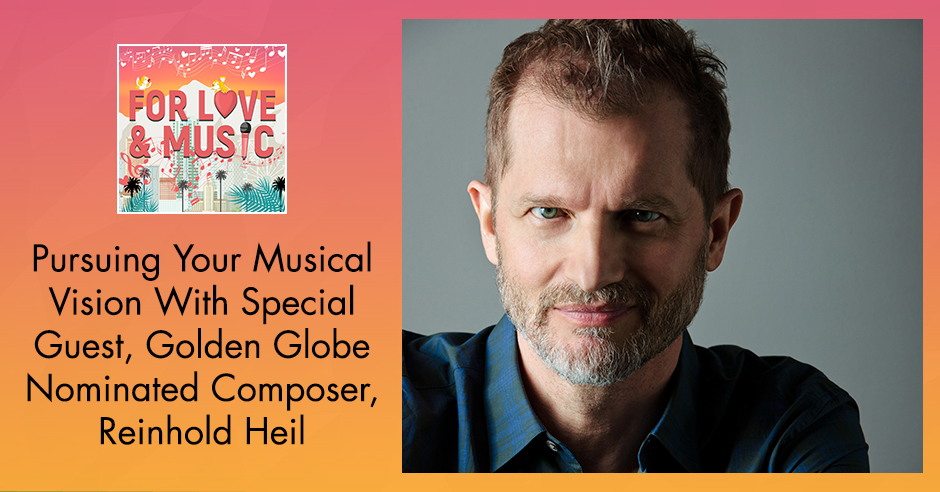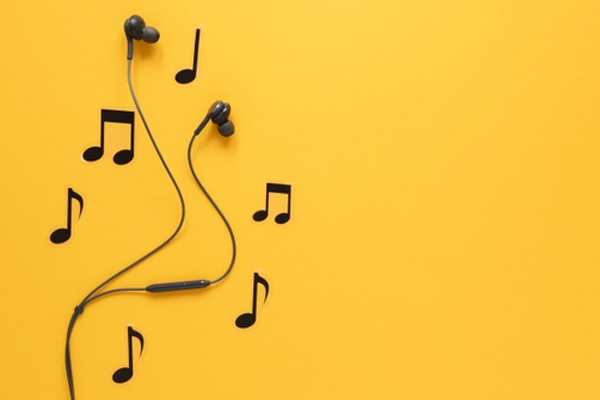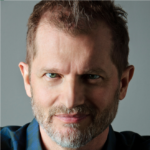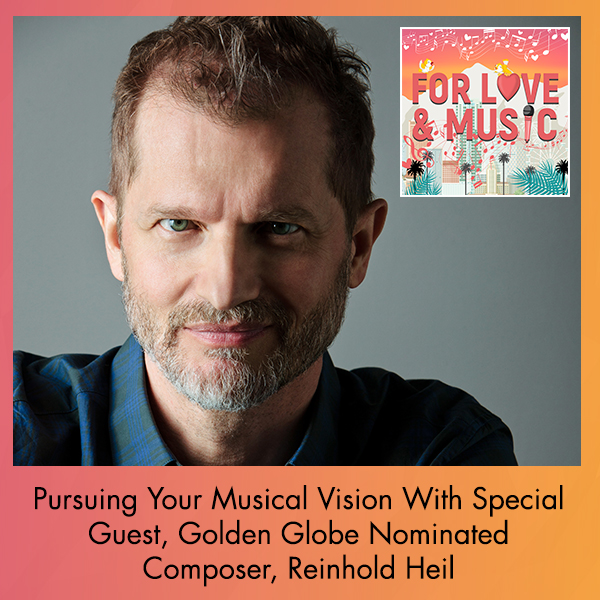
Learning everything by himself through improvising and listening to the pop music of his time, Reinhold Heil always had the vision of being in the studio with other musicians making music, being on stage, and playing for thousands of people. Years later, that vision became a complete reality. Reinhold is a German-born musician and Golden Globe-nominated film and television composer based in Los Angeles. On today’s podcast, he sits down with Tara Joseph to talk about his incredible journey from Germany to Los Angeles to Hawaii, all for love and music.
—
Listen to the podcast here:
Pursuing Your Musical Vision With Special Guest, Golden Globe Nominated Composer, Reinhold Heil
I do hope everyone is staying safe and healthy during these challenging times. All the way from Hawaii, but originally from Germany, let’s welcome Golden Globe nominated composer, Reinhold Heil. Reinhold, how are you?
I’m good. Thank you.
I’m sure the readers are desperately jealous. How did you end up in Hawaii?
The first time I set foot on this Island was in 1994. I tried two islands: Kauai and the Big Island. I spend a week on each one and drove around a lot. I experienced nature and experienced especially the crazy variety of climates and landscapes on the Big Island and already stood there on some mountain with cows grazing and ice and snow, a dead volcano in the background, which looked Switzerland. I’d made a 90 degree turn and I saw the Pacific Ocean lying there. That was such an unbelievably mind-blowing moment that I said, “I think I want to live here one day.” Unfortunately, it took another 26 years, but finally I decided to take advantage of the pandemic to be honest, which is not my usual thing.
I have seen quite a few big changes in the world, especially in Berlin in ‘89 when the wall came down, and I somehow never took any personal advantage of it. In this case, I think I did. I said, “This is the chance.” I think everything’s going on Zoom, everybody’s getting used to work on Zoom. I haven’t seen that many people that I’m working with. I’m seeing them only at the beginning of a project and everything is remote. Even within Los Angeles, people don’t see each other anymore.
I never see anyone.
I might as well. After only four years, put my house on the market and was able to sell it because I think people want people have a higher appreciation for the home because they spent too much more time there. They work from home and all of that stuff. I think I had a home that was suitable for that purpose. I live in the outskirts.
I’m jealous. I have been to Hawaii a couple of times. I went to Hawaii for honeymoon. I fell madly in love with it. I know you’re on the main island. I’ve said many times to my wife that I could move to Hawaii.
Hawaii is extra blue before because it has these subtropical rainforests, which actually do exist here on the East Coast of the Big Island as well. It’s the set for Jurassic Park. It was shot in Kauai. They didn’t have to build anything. These waterfalls, there was no special effects. This is Kauai the way it is. It’s amazing.
I read a lot about you and I know that you were there in Berlin when the wall came down. I would love to hear more about that, but how did you end up going from Germany to LA prior to now being in Hawaii?
Everything is remote. Even within Los Angeles, people don't see each other anymore. Click To TweetIt has also personal reasons. In the ‘80s, I produced NENA’s big monster hit, 99 Red Balloons. I was a top producer and I had the opportunity to move to LA or move to New York, maybe move my business there. I was invited to MTV Music Awards and I didn’t go. I had personal reasons. I had a sick girlfriend at the time. That kept me in Berlin. I love Berlin. I still do and it’s a hard place to leave. In the ‘90s, I married an American woman and that was while I was still in Berlin and she lived there for a while and didn’t like it there anymore. I thought maybe this is a sign and I should go finally, because I’ve been thinking about the US for quite a while.
You moved for the same reasons as me, for love and music.
I also was not a film composer at that time. I had literally started to enter the field. I had a slump of 5, 6 years in the early ‘90s. I hung out with actors and directors and started working for film then in the mid ‘90s and also met my business partner, Johnny Klimek. We together met Tom Tykwer and we did a bunch of seminal movies with him. That even enabled the fact that I was able to set foot not only into California, but into the business. Neither do I have connections, nor did I have a track record. It was a crazy move back in early 1997. On top of all of that, I moved to Santa Barbara, which is ridiculously beautiful, but two hours away from LA is already too far to make enough contacts to get into the into the industry. When I was already in Santa Barbara, we did the music to Run Lola Run, and that started opening some doors.
Already speaking then, naming the credits of some of the projects you’ve been involved with, it’s extraordinary. I do want to pull you up on 99 Red Balloons. That’s one of my all-time favorite songs. When I moved to LA, our next-door neighbor was a German lady and she always told us that she was a pop star in Germany, back in the ‘80s. She would sing 99 Red Balloons every single day, multiple times in the garage. She’d sing it. Every time we drove in and out of our garage, she’d be singing in her next-door garage 99 Red Balloons every day.
Maybe I would start with the therapy and a decent drug.
It’s so funny. She’s moved now. It’s not such a part of our lives, but I love it every time it comes on the radio. I’m excited that you produce that.
You have to tell me what her name was.
Stephanie, I don’t know what her last name was.
It doesn’t ring a bell. I know tons of Stephanies.

Let’s go way back to the beginning. I presume you were a musical child. I know you’re a multi-instrumentalist. When did your musical career take off? I know that you are in a famous, legendary German punk band, the Nina Hagen Band and Spliff. How did it all begin? How did that all start?
I was musical, but I don’t come from a family that you would call Bildungsbürgertum, which is this German term of the educated middle class. It’s coming from both sides. My parents are from farmers, and my father was a craftsman. He was an electrician and built a business and they were of this typical German war generation. They were too young to be in the war. They were deprived of their childhood by the Nazi times. They were born in ‘28 and ‘29. They had their family in the ‘50s when everything was rebuilt and their principle was, “Let’s try and make a better future for our children.” It was this selfless approach where I had the feeling, they were deprived of their own childhood. They were taking care of us for the rest of their lives and working their butts off.
I’m still flabbergasted because there was not much of a selfish thing. They did get some traveling during their retirement, but what they were doing, they were enabling what any one of us wanted to do. That included, in my case, they bought the simple piano and they gave me piano or paid for piano lessons when I was eleven. I didn’t practice enough because I didn’t come from that educated middle-class background but the parents are actually on your back that you’re actually practicing your music. Anything but a prodigy existence. I learned everything by myself by improvising, listening to the pop music and listened to the Beatles and the Stones and all of that stuff. I had my own little band when I was sixteen for the rest of my high school days and found a program in Berlin at the Academy of Music that was classical music production, where you didn’t have to be a prodigy piano player or something.
I was way too intimidated by the prospect of studying composition. This has a lot to do with your background. You have to fight for everything, every little step you have to discover yourself. You don’t get any doors opened by anybody. That was fine because they barely accepted me into the music academy, and they started using this more or less as a means to an end. The end was to play in a pop band and produce rock music or pop music. I had that vision when I was fourteen and I was listening to all of this music. I would never tell anybody about it. It’s very un-American.
In America, everybody thought, “This is my dream.” You’re like, “I don’t want to jinx it. I’m going to keep my mouth shut.” Not even my parents or my siblings knew. I literally had visions in my mind about being in the studio with a bunch of other guys or gals and making music and being on stage and playing for thousands of people. About ten years later, that was a complete reality. I had no idea how it happened. I guess I automatically shifted in the right directions at the right moments. I was also lucky and I knew I had to go to Berlin and not to another town, because in Berlin was where it all happened. You would inevitably meet people who would give you momentum or something would gel and come together and interesting stuff would evolve.
That then happened a few years later in ‘77, when a guitar who I knew said there’s this woman who is a dissident from East Germany, but she’s an amazing vocal talent. She was somewhat of a star for easy listening pop music in the East, but now she’s here in the West and she has a record contract with CBS Records and she came back from London. She hung out with the Sex Pistols, but she couldn’t get a band together. She’s not back in Berlin and she’s looking for musicians. We started that band. We already had a record company because she had such star qualities. We did two albums with her and it was ridiculously successful because it was a good band. She was an outstanding, charismatic performer with ridiculous vocal capabilities and she still is. I think she’s one of the most talented people I’ve ever met.
I was still a student. I was still studying how to produce classical music, which included studio technology. At the time, it wasn’t as easy as it is now, because now you buy yourself a laptop and a bunch of software and you have a studio and you can use it the way we use these ridiculously expensive, big pieces of equipment and professional recording studios, where it was super hard to get in. It costs a lot of money to get in there and spend time. You had to go through the system of A&R managers at record companies who would decide who is worthy to go to that studio and make some music. Those were crazy times. Now, we have Bandcamp and you do your own album, you put all in Bandcamp, and yes you cannot make millions of Bandcamps. There is a difference.
You’ve been on an incredible journey. As you were mentioning, you have worked on some extraordinary films and you collaborated with Tom Tykwer and you worked on Run Lola Run with him, which is a brilliant film. You were nominated for a Golden Globe for Cloud Atlas.
That was the last project I did that combo.
You have to fight for everything. Every little step, you have to discover yourself. You don't get any doors opened by anybody. Click To TweetDid you work on Perfume: The Story of a Murderer? That’s such a brilliant film.
Sixteen years, we were a team. Johnny and I did other movies. We worked on Deadwood, an HBO show. It’s something that’s relatively well-known, whether it be international, political thriller, which I thought was a cool score. It was quite a range of styles. That was our school in terms of how to score and every time it was like another interesting challenge where we had the feeling that we needed to reinvent the wheel for ourselves. It was time-consuming. What I’d like about it was that it was never following a typical method. This is how Hollywood does film scoring. I have to admit that at some point I found it a little bit too tedious.
I thought that we were not productive. We weren’t using our energy only for the creative side. I came around to the Hollywood method, how you make scores. There are reasons why Hollywood scores are made in a certain way and they’re not all bad. I think the worst part of it is that is the temp music where the editors put music against the picture while they edit and they take it from other movies. Especially when filmmakers are getting used to the temp music and they basically tell you to imitate it, then you have the feeling, it all goes round and round on this plane. When you love the music, you see that. It’s always the filmmaker who enables this, it’s not the composer. You can say, “I’m doing something completely different.” If the filmmaker is not on board with that, you’re either going to be fired or you have to do whatever they want. Sometimes stuff happens that’s awesome. For instance, Dave Barrel and Ben Salisbury, two Brits. When they score stuff, it’s completely outside of the norm of normal film scoring. This is what I love and what I would like to be.
What’s your process? When you’re asked to do a film score or a score for a TV series, are you given the scripts first? Are you given a synopsis?
It’s always different. It depends on whether you have an existing relationship with somebody. If you have that, then they give you the script. Often, they give you the script also when they are already way late in the process, they already have a rough cut of the film. It’s the typical Hollywood moment whereas an afterthought, look for the composer or something. They send you out the script and if your interview goes well and your records are good and you get the job, then you’re confronted with a cut from the film that actually has temp music in it. It raises this issue where, how attached have people become to the temp score, because they see it every day while they are working on the edit.
They hear this music with this particular picture, although it’s not made for this picture, but they hear it about a thousand times before you even have the chance to put your own version on it. They hear that one time and they’re like, “It’s not quite what we thought.” You’re like, “What you thought is the temp, then you have to license the temp,” which of course you don’t want because you want something special. It’s a contradiction in terms. Those are the worst-case scenarios and the best-case scenarios are that you have a relationship with a filmmaker or a show runner and they give you the script early on. They give you little scenes that they’ve put together and they have meetings and you have conversations and you talk about the subject matter.
You talk about what point of view the music should take because the music, just like the camera, can take a point of view in each and every scene. Are we with this protagonist or that protagonist? Are we changing it up in the middle of the film? That’s the most important job of the film composer is to support that. Which POV are we taking? It does not always have to be so on the nose or to supply some backdrop of emotional ambiguity that the viewer can fill for themselves where they can take a point of view, either one or the other. My oldest son always loved Darth Vader for whatever reason. He’s not abusive.
Is your son musical?
Both my sons are musical and they’re both not musicians.

Are they living with you in Hawaii?
I wished. I guess they wished that coming for Christmas. They both are in university. One is at UC Santa Barbara and the other one that Occidental College in Los Angeles. My youngest son and four of his friends have rented an Airbnb in Colorado. They have their own mini campus. That was a good idea, isolating amongst the five of them. It’s a cool idea. They’re close, pretty nerdy, all five of them as far as I can tell. My other son, I think he’s suffering. He’s in Northern California where his mother lives and he has friends there, but for him it’s a little bit harder. He can’t wait to go back to Santa Barbara. I guess in January he’s going to go back.
One of your more recent projects, the Deutschland series, which I believe you can watch on Amazon Prime. It was on Sundance TV.
It depends on which territory it’s complicated. I can’t tell you exactly. I know that in the United States, the first two seasons are on Hulu. The third season is currently airing week by week, every Thursday night on Sundance TV in the US. That’s the situation for the United States of America. In Germany, it’s on Amazon Prime all the way through. There is a whole slate of broadcast stations. Britain, I think it is channel four, unless it has changed, but I don’t think it has. There are all these broadcast stations that broadcast the first two seasons that are currently, or in the near future going to do.
I’m glad that you explained that because now the readers know where to find it, whatever country they are in the world. The music is so powerful.
They appreciate what the music does. It’s a pleasant collaboration that I had there. I’ve never worked with the showrunners, Joerg Winger and Anna Winger. They contacted me in late 2014 and they had stopped shooting Deutschland 83. They sent me a few scenes and I did a few layouts and on Christmas and 2014, they came to Los Angeles and we spent a few days talking about the project. The craziest thing about it was because I had lived through it, but I also lived sixteen years in West Berlin when the wall was up all around it. I’d lived scenes from the show myself. It was really well-researched. New York is quite a few years younger than I, but he was in Germany.
He was in the military at the time in 1989, when the wall came down. They had these listening stations where they were listening to the Russians. Can you believe that they were spying on the Russians? They had no idea that the wall came down, somebody came running and had watched television like every other German. They said, “The wall’s coming down, you have to see it.” They were going like, “What?” They took their headphones down where they were listening to the Russians, spying to the Russians, tried to be ahead of the game. They had totally worked because the Russians didn’t get it either. It was such a crazy thing where I think more or less a misunderstanding in communication internally in the Eastman administration led to the fact that they opened that one little gate. Nothing could be stopped anymore. It’s explained in the show in Deutschland 89. The first episode starts with that situation where the wall opens. The season unfolds from there, where everybody in the West and the East has to reinvent themselves.
You’ve moved to Hawaii, are you working from a home studio because of COVID? Do you usually work from a home studio? What’s your set-up?
I was a trailblazer. I put my home studio together in 1984. I pretty much had been doing it since then. This is a two-inch reel-to-reel machine, then I bought a fair light and a big mixing board and everything. All of that was in my apartment. That’s all because I had had success with my band Spliff, I had had more success with producing 99 Red Balloons. I had money and I took a beautiful apartment in an old attic in Berlin and put a recording studio into it. The situation is different. On a flower farm with our two little buildings. Each building is basically one and a half.
Getting the technology is now cheap. Don't spend all your time on TikTok. Go a little deeper, have some musical training. Click To TweetIs that the Airbnb you’ve rented? A flower farm?
It’s totally beautiful.
I’m jealous.
The property is manicured. There are palm trees. You have these bird calls in the middle of the night. You have crazy roosters that announced that they’re open for business. It’s totally nice. It doesn’t have a lot of square footage and I’m building a house. We have moved here. We’re pretty quick because we already have a property and we have a builder and we’re designing the house right.
How long will it take?
That will take easily a year and a half, and we’re hoping to stay up here. It’s a little bit moist, it’s 1,500 feet above the ocean and you have this panoramic ocean view. The container with all our stuff has come in. We had to put most of it in storage because these two little buildings that are connected are fairly small. I have extracted my core system and I’m building it from the ground up all by myself. I don’t have any assistance with me. After six years, I don’t want to call him my assistant anymore because he’s so instrumental and has worn many hats that are important for my work. It’s Paul Parker. He, crazily enough, has moved to Atlanta. Where he moved three time zones East, I moved two to three time zones West. You can still log onto my computer.
We’re going to collaborate on setting up the system and reinvent it a bit and also in projecting onto how the new studio is going to be. It’s not going to be your traditional recording studio. It hasn’t been that in a long time and it’s not necessarily. Even if I record musicians or if I record myself, by the way, multi-instrumentalist is only on the film scoring level, which means you don’t have to use, to be able to play these instruments. I’m a keyboard player and that’s what I can play decently. When I take a guitar in my hand, it’s a noise generator.
What advice would you give to any young readers out there who are keen to become a composer? Any tips and tricks?
I would give parents the tip to not only give musical equipment to boys, but also to girls because the process starts early. If you get into your twenties as a woman and you go, “I want to become a film composer,” you are at a humongous disadvantage compared to all the guys who had their first little drum computer and laptops set up, set up by their parents when they were thirteen. They were able to grow into that and learn the software and learn this technological side of things in a playful way, because the technology has become important. I’m not saying that you can’t write music with pencil and paper, but I would say that that is more or less than you can be confined to writing concert music. I’m sure that the actual concept composers also don’t use pencil and paper anymore.

I don’t know. They are still around us. I’m sure John Williams still does it. He has people with computers who do all the orchestration. Getting that technology is now cheap. Don’t spend all the time on TikTok. Actually, the same technology is used to make little TikTok videos. There you go, go a little deeper, have some musical training. It feels so strange to me because when I was at that age, high school and college, it was about being in a band so you could get the girls. You had to be in a band. People skip that stage because they realize there’s no money to be made to be in the band unless you’re in the super top league.
It’s back to where it was, where only the big superstars even get to make the albums. You can make your album, but you can put it out for free, maybe Spotify is going to make more money than you will. That’s the most important thing. A lot of these people who say, “I want to be a film composer.” During college years, they have to get into one of these programs and there are tons of them out there. There are so many more programs that will teach you film scoring. I wouldn’t know which ones are the best. Berkeley is still around. Columbia College is good. University of Southern California is the most expensive because it’s a private college.
You have some professors that are already established in the industry. People get their contacts there. It does make sense to study this properly as opposed to what I did. Hang out with filmmakers and score their movies for free. Hang out with film students, score their movies. Go out 30, 40, 50 little short movies, whatever it is. That seems to me because then not only are you honing your skills, but you’re also developing relationships with people, some of which might actually have a career and they bring you along. As a composer, the most valuable thing is to be on a team with an interesting producer/director who does good projects.
Reinhold, it’s been such a pleasure to talk to you. I’m incredibly jealous that you’re living in Hawaii. If I come there on holiday, I will let you know. Thank you so much. It’s been a pleasure talking to you. I can’t wait to see what the future holds because you’ve had such an amazing journey to date.
I’m not going to stop. It’s going to have to be nature that stops me.
I think we’ve got many decades of you and new music ahead of us.
Do the math, then you’ll realize it’s not that many decades.
Thank you. Thank you to all our readers. Stay safe and healthy.
Important Links:
About Reinhold Heil
 Reinhold Heil was born in Germany, where he began training to become a classical pianist at a young age. At 14, Reinhold’s career objectives underwent a seismic shift when his father, who owned a record and hi-fi store, brought home a Braun reel-to-reel tape recorder.
Reinhold Heil was born in Germany, where he began training to become a classical pianist at a young age. At 14, Reinhold’s career objectives underwent a seismic shift when his father, who owned a record and hi-fi store, brought home a Braun reel-to-reel tape recorder.
The moment Reinhold discovered he could create bizarre electronic soundscapes with his new machine, he was hooked. He began spending countless hours experimenting and exploring, creating strange atmospherics and unexpected textures, sparking what would become a life-long passion for experimentation and sound synthesis.

